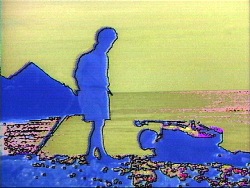Search Results
Search Results
Title Results
Your search returned 808 Titles
In Great Mother (HARUMI), the first part of a trilogy, Idemitsu portrays fourteen-year-old Harumi's rebellion against her domineering mother. Harumi cannot escape her, even locked in her bedroom; a television monitor showing the idealized mother in a traditional Japanese kimono looms over her as...
The domestic melodrama Great Mother (SACHIKO) examines the insularity of women's roles in the Japanese family, focusing on the relationships of mother and daughter, husband and wife. Caught between her possessive mother and abusive husband, Sachiko struggles through her daily existence. Her...
The second part of a trilogy, Great Mother (YUMIKO) is a domestic melodrama that examines the cultural and familial role of Japanese women by tracing the psychology of a turbulent mother-daughter relationship. Yumiko, a rebellious young woman from an affluent family, encounters resistance from...
"A table is set with two identical red books placed at diagonal corners and a stack of three poker chips placed in the center. Two women, Tina Girouard and Susanne Harris, enter the frame. Harris is wearing a red blouse, Girouard a blue blouse with a red carnation in her buttonhole. They shake...
The final installment of the Yonemotos' Soap Opera Series uses the deadpan syntax of television melodrama to tell the story of Sumie, a young Japanese woman who marries an American surfer/filmmaker for the green card that will allow her to pursue her artistic career. Falling prey to the seductive...
Greetings from Amarillo uses seven songs by Hayden Pedigo to structure a portrait of the north Texas landscape.
Guadalcanal Requiem
Nam June Paik with Charlotte Moorman
1977, re-edited 1979, 28:33 min, color, sound
One of Paik's most overtly political and poignant statements, Guadalcanal Requiem is a performance/documentary collage that confronts history, time, cultural memory and mythology on the site of one of World War II's most devastating battles. Guadalcanal in the Solomon Islands is the iconic...
X-PRZ constructs a powerful collage of rap music, authorial text, and iconic visuals to confront the politics of race in the context of the American media. Writes Tony Cokes: "Slick and easily legible Pop surface: deploying the Black male media projection as central model, heroic figure, and...
"Hack Your Face was recorded live during a participatory performance/installation event at Eyebeam in Chelsea, NY. We set up our synthesizer, Sync Armonica with an additional module (called Circuit Taco): a signal amplifier connected to a ¼ inch cable. When participants touch the cable, their...









